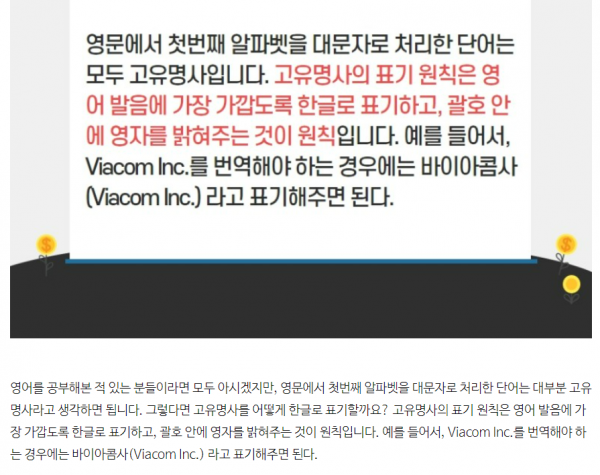[Business Translation (Advanced - ITT Level 1,2)_New] 모듈 2 homework 피드백 관련
Page
Name HEEJUNG LEE Date21-07-19 05:50 View2,638 Comment2Content
피드백에는 크게 3가지의 의견이 있었습니다.
우선, 3가지 모두가 감점의 요인이었는지 궁금해서 질문드리고 싶습니다.
그리고 각 항목에 대해서 드리고 싶은 말씀이 있습니다^^
1. Proper nouns 번역 관련: Mason 선생님께서는 영어 대문자로 나오는 지명이나 사람 이름 등은 그냥 영어로 그대로 두라고 말씀하셨습니다.
그런데 한국에 있는 대학교의 영문학과 번역학 수업을 들었을 때 영어는 항상 우리말로 표기하는 것이 원칙이라고 배웠습니다. 이 부분은 논문을 쓸때도 항상 적용되는 부분입니다. 수년간 그렇게 교육받아왔고 한국에서 그렇게 하고 있기 때문에 고유명사 번역과 관련해서는 너무나 혼돈스럽습니다. 혹시 몰라서 아래에 그와 관련되는 부분 첨부합니다.

2. why와 why not 부분 코멘트 남겨 주셨습니다. 강의 영상 확인했는데 왜 못느끼는 것일까? 라고 설명해주셨습니다. 저는 답안에 왜 존중받고 있다고 못 느끼는 걸까? 라고 적었습니다. 이 부분이 왜 감점의 요인이 되는지 이해가 되질 않습니다.
3. bandwagon 부분 코멘트 남겨 주셨습니다. 유행이라고 단어 설명해주셨지만 선생님께서 참고로 보여주신 우리말 번역에는 그 부분이 생략된 채로 나와 있었습니다.

이 부분과 제가 해석한 부분의 큰 차이가 없어 보이는데, 조금만 더 자세하게 설명해주시면 감사하겠습니다.
그러면 선생님의 답변 기다리고 있겠습니다.
감사합니다^^
Comment list
Mason 님의 댓글
Mason 쪽지보내기 메일보내기 자기소개 아이디로 검색 전체게시물 Date
Hello Heejung!
Thank you very much for your questions and I am glad that you checked my feedback on your homework.
Before I go over each one of your questions, I would like to clarify one thing first: the deduction in your mark may or may not be due to the points I mentioned in the feedback. I check the overall quality of your homework and give you the mark I believe you deserve, not necessarily because of one or two translation mistakes in your translation.
——————
Q1. Proper nouns
If you read my feedback carefully, I said “it would be perfectly fine and actually preferred ‘in this class’ to leave proper nouns in English.”
The reason why I leave such feedback is mainly because I have had many students asking for corrections on this issue in the past, especially for all of the proper nouns in the first two articles in Module 2. To make it crystal clear, translating (or not translating!) proper nouns will not affect your marks on your assignment; however, what I want to emphasize more is the consistency in your translation.
I see that you translated some words into Korean, and some you just left them in English. For instance, you translated "Wood Buffalo National Park in Alberta" into 앨버타주의 우드 버팔로 국립공원, but not "Black Currant Iceberg, Bakeapple Iceberg" or "Sourdough Saloon." Furthermore, what made you decide that you translate the brand names such as Old Navy into 오울드 네이비 or Canadian Tire into 캐나다 타이어 but not American Express? Because frankly speaking, if you were in North America, you would not say/write "오울드 네이비" nor "캐나다 타이어" for these words, and saying "아메리칸 익스프레스" or "아멕스" is indeed common in Korea.
Many students struggle to have a clear guideline on their own to come up with translation for proper nouns so that is the reason why I tell students to simply leave it in English in this course. Although you mentioned that there is a “standard” way of translating in Korea, you will often have employers who provide the glossary or special instructions on such proper nouns for business translations.
——————
Q2. ”Why” and “Why not?”
Once again, what I stated in my feedback was to check what I said about these two expressions, not necessarily because you mistranslated this part. The reason I provided this feedback is because many students do not necessarily differentiate the two expressions. Simply, I think it is sufficient if you believe you completely understand the reason why I say how these two expressions were translated with caution.
——————
Q3. “Bandwagon”
What I was referring to in my feedback as “how I explained the word bandwagon” was not my translation, but the whole explanation of the word “bandwagon” and how its connotation or nuances are like when it is used in a conversation. I am talking about the one with the picture of the horses. I believe it is hard to miss this explanation if you watched the lecture video.
——————
One thing I would like to also add is, unless it is that you want to practice writing in Korean, I encourage all students to write questions in English (of course unless you need to mention words/sentences in Korean specifically.) This is to improve students’ ability to communicate in their second language more proficiently. So if you could try writing questions in English next time, that would be greatly appreciated Heejung!
I am definitely going to make a correction to your mark as I believe it was partially my fault that I did not make it clear how you should interpret my feedback in the beginning of this course. I sincerely hope this helps!
Best regards,
Mason U, CMI-Korean
Business Interpretation and Translation in Korean (BIT-K) Instructor
